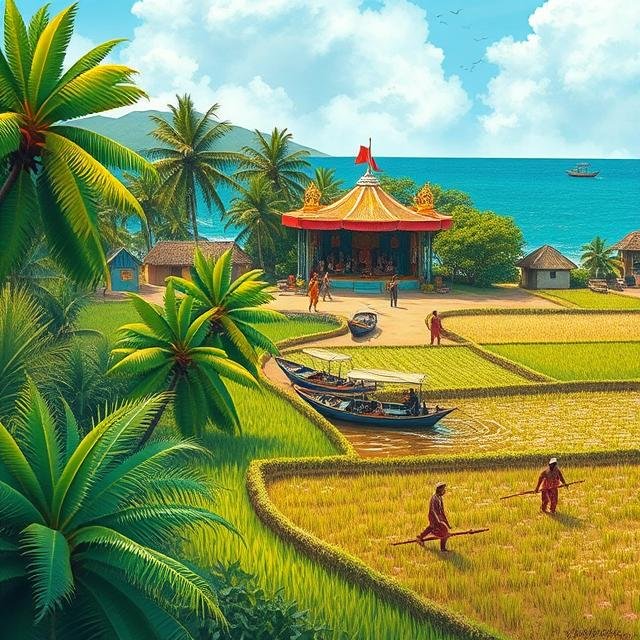The word “Byadi” may not be globally recognized, but it carries deep cultural, historical, and geographical significance in the Indian subcontinent. Byadi is a coastal town located in the Dakshina Kannada district of Karnataka, India. While relatively small in scale compared to major cities like Mangalore or Udupi, Byadi plays an important role in the cultural and economic landscape of the region. Its identity is tied to agriculture, traditional practices, and its unique connection with the diverse communities that inhabit the coastal belt.
This article explores the essence of Byadi in terms of history, traditions, economic activities, language, and lifestyle, while also answering some frequently asked questions at the end.
Table of Contents
Geographic and Historical Overview of Byadi
Byadi lies in close proximity to the Arabian Sea and is influenced by the coastal climate of Karnataka. The region experiences heavy monsoon rains, humid summers, and relatively mild winters. This geographical setting has shaped its agricultural practices, fisheries, and daily life of its residents.
Historically, Byadi’s story is woven into the broader cultural narrative of coastal Karnataka. The region has seen the rise and fall of dynasties such as the Alupas, the Vijayanagara Empire, and later the influence of Portuguese and British colonial powers. This historical layering has left a mark on its cultural practices, architecture, and religious traditions.
Cultural Identity of Byadi
One of the most fascinating aspects of Byadi is its cultural diversity. Coastal Karnataka is known for being a melting pot of traditions where Hindus, Christians, and Muslims live side by side, often sharing festivities and community events.
- Language: The primary languages spoken in Byadi are Tulu and Kannada. Tulu, in particular, holds immense cultural value as it is deeply tied to folklore, oral storytelling, and regional theatre like Yakshagana.
- Festivals: Byadi celebrates major Indian festivals such as Deepavali, Eid, and Christmas, along with local rituals like Bhoota Kola (a spirit worship ritual), Nagaradhane (serpent worship), and Kambala (buffalo racing). These traditional events form the backbone of its cultural identity.
- Cuisine: The food culture of Byadi reflects the coastal influence. Dishes are often coconut-based, with seafood like mackerel and sardines forming staples. Rice, curry leaves, red chilies, and jaggery are commonly used in households.
Economy and Occupation in Byadi
The economy of Byadi is predominantly agrarian, but its coastal location also makes fishing an essential livelihood for many families.
- Agriculture
- Coconut plantations and paddy fields dominate the agricultural landscape.
- Areca nut and cashew are also grown widely, often serving as cash crops.
- Farmers rely on monsoon rains, although irrigation systems have improved over time.
- Fisheries
- Byadi’s proximity to the Arabian Sea ensures fishing remains a backbone industry.
- Traditional fishing boats as well as mechanized trawlers are used by local fishermen.
- The produce is sold in nearby towns, contributing to both subsistence and income.
- Small Businesses and Trade
- Local markets thrive in Byadi, where agricultural produce, spices, and seafood are traded.
- Handicrafts and small-scale industries, though limited, provide additional employment.
Religion and Spiritual Practices
Religion is deeply rooted in the daily lives of Byadi’s residents. Temples, mosques, and churches are not just places of worship but also community hubs.
- Temples: Ancient temples dedicated to local deities serve as centers for rituals and annual festivals. The influence of spirit worship (Daiva) is strong, reflecting the syncretic traditions of Tulu Nadu.
- Mosques: The Muslim community in Byadi plays an active role in trade and culture, with mosques forming the spiritual and educational centers.
- Churches: Christianity also has a foothold here due to Portuguese influence, and churches host vibrant community gatherings.
This coexistence of diverse religious groups adds to Byadi’s identity as a place of unity in diversity.
Education and Modern Development
While Byadi retains its traditional charm, modern education and infrastructural development are gradually reshaping it. Schools and colleges in nearby towns like Mangalore and Udupi attract students from Byadi. Literacy rates have been improving, leading to migration of younger generations into urban centers for jobs in IT, banking, and healthcare.
Infrastructure development has also seen improvements in road connectivity, housing, and access to healthcare, though rural challenges remain.
Folklore and Performing Arts
Byadi, like the rest of coastal Karnataka, is rich in folklore traditions. Yakshagana, a vibrant theatre form that blends dance, music, and storytelling, is widely performed during festival seasons. Folklore often carries themes from epics like the Ramayana and Mahabharata but also incorporates local legends.
The oral storytelling traditions in Tulu language have ensured that myths, moral stories, and local history continue to be passed from one generation to the next.
Challenges Faced by Byadi
Despite its rich heritage and natural resources, Byadi faces challenges common to many rural coastal towns:
- Urban Migration: Many young people move to bigger cities, leading to a decline in traditional occupations.
- Climate Impact: Erratic rainfall patterns and coastal erosion affect both farming and fishing communities.
- Economic Transition: Dependence on agriculture and fisheries leaves the economy vulnerable to market fluctuations.
Addressing these challenges requires sustainable development policies, skill-based training, and better connectivity with urban hubs.
The Future of Byadi
The future of Byadi lies in balancing its traditions with modernization. Tourism could play an important role, as Byadi offers cultural richness, natural beauty, and authentic coastal experiences. Eco-tourism, agricultural tourism, and cultural festivals could help in generating income while preserving the local way of life.
With younger generations seeking education and employment in global industries, Byadi’s story is also evolving. The preservation of its language, folklore, and rituals will determine how strongly it holds on to its cultural essence in the future.
FAQs About Byadi
Q1: Where is Byadi located?
Byadi is a coastal town situated in the Dakshina Kannada district of Karnataka, India.
Q2: What languages are spoken in Byadi?
The primary languages are Tulu and Kannada, though Konkani and Beary are also spoken in surrounding areas.
Q3: What is the main occupation of people in Byadi?
Agriculture and fishing are the main occupations, with coconut, areca nut, and paddy cultivation being prominent.
Q4: What festivals are unique to Byadi?
Traditional events like Yakshagana performances, Bhoota Kola, and Kambala are unique to the region.
Q5: Is Byadi a tourist destination?
While not yet developed as a mainstream tourist destination, Byadi’s cultural richness and coastal charm hold great potential for eco-tourism and cultural tourism.

